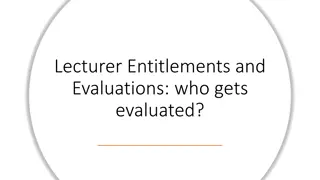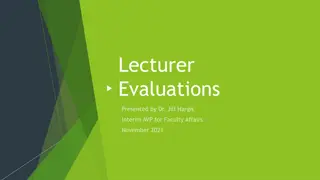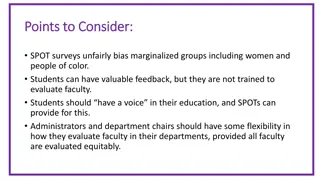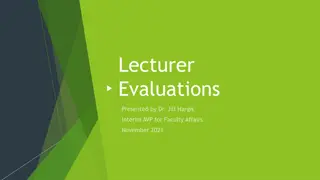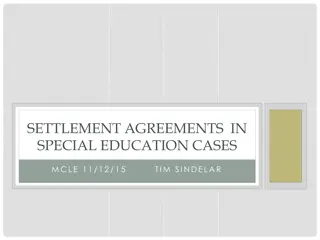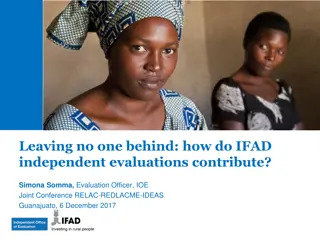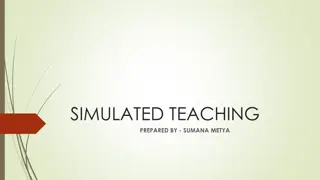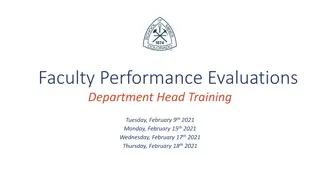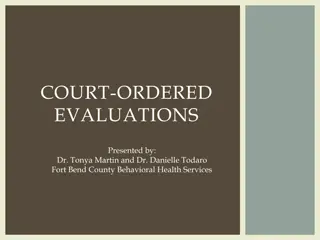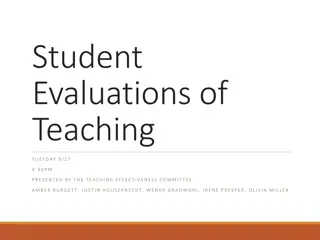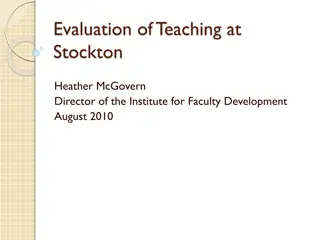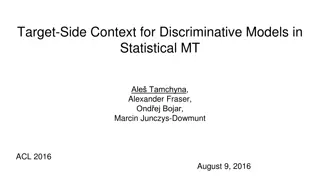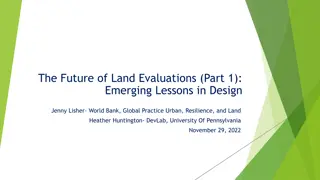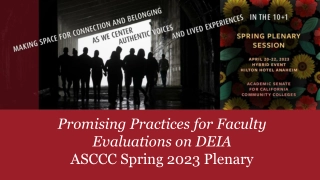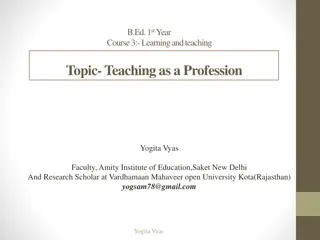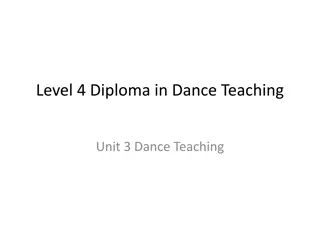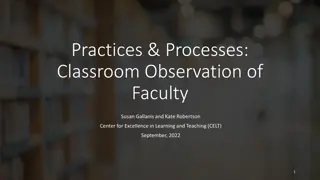Evaluations and Context in Teaching: A Comprehensive Overview
Gain insights into student evaluations of a merchandising and design teacher at IU Bloomington, covering feedback, reviews, and evaluation scores. Explore the importance of contextualizing teaching methods and philosophical reflections based on student feedback.
Download Presentation

Please find below an Image/Link to download the presentation.
The content on the website is provided AS IS for your information and personal use only. It may not be sold, licensed, or shared on other websites without obtaining consent from the author. Download presentation by click this link. If you encounter any issues during the download, it is possible that the publisher has removed the file from their server.
E N D
Presentation Transcript
AM I A GOOD TEACHER? MARY EMBRY MERCHANDISING + DESIGN IU BLOOMINGTON FALCON
THE REVIEW I hated this movie. Hated hated hated hated hated this movie. Hated it. Hated every simpering stupid vacant audience-insulting moment of it. Hated the sensibility that thought anyone would like it. Hated the implied insult to the audience by its belief that anyone would be entertained by it. -Roger Ebert
THE REVIEW What was the most important thing you learned in this class? pointless class to make mandatory Tests hard class boring I haven t learned much nothing
WHAT DO MY EVALUATIONS SAY? H404 BEST Student Evaluation Mean Scores Developed skills needed for field 2.83 I learned a lot in this course Atmosphere conducive to learning Grading system was clear Assignments help to learn material Objectives agree with what is taught Rating items Instructor Objectives are clearly stated Makes me feel free to ask questions Shows interest in students Incorporates current developments Is knowledgeable Asks challenging questions Inspires interest in content 2.98 Enthusiastic SP10 Explains clearly Well prepared Instructor is outstanding Quality of course is outstanding 0 0.5 1 1.5 2 2.5 3 3.5 4 Mean Scores 4 point scale Campus Mean Range: 2.8 to 3.3
CONTEXT FOR STUDENT EVALUATIONS teaching methods Teaching methods represent adaptation to your environment Application Practice Reflection teaching philosophy Teaching evaluations should be contextualized by the story that is created through the process of learning to teach. teaching statement
CONTEXT FOR STUDENT EVALUATIONS teaching methods Application Current Topics information literacy identify + explain concepts teaching philosophy Practice Written + In-class exercises Reflection current topics language lots of grading minimal impact teaching statement
CONTEXT FOR STUDENT EVALUATIONS teaching methods internationalize content Application describe examples/scenarios Worldview Reflections explain concepts teaching philosophy use/outside conversations Practice Written + In-class exercises teaching statement Reflection relevancy language
CONTEXT FOR STUDENT EVALUATIONS teaching methods I could leave the classroom with something to talk about with my friends I liked how relevant the material was not only to my major, but to the real world. It was taught in a way that explained potentially confusing topics in an understandable way. I have already began to participate in conversations with adults and students alike about international trade topics teaching philosophy teaching statement this class inspired me on what I want to do as a career/citizen
4 3.8 3.6 3.4 Quality of course is outstanding Instructor is outstanding 3.2 3 2.8 4 2.6 2.4 3.8 2.2 2 1 2 3 4 5 6 7 8 9 10 11 12 3.6 3.4 Enthusiasm and Intellectual Stimulation Enthusiastic 3.2 3 Inspires interest in content 2.8 Asks challenging questions 2.6 4 2.4 I learned a lot in this course Vocational Development 3.5 2.2 3 2.5 2 1 2 3 4 5 6 7 8 9 10 11 12 13 2 1 3 5 7 9 11
CONTEXT FOR STUDENT EVALUATIONS teaching methods Tie evaluation with what matters to you as a teacher teaching philosophy Methods inform philosophy speaks to who you are as a teacher becomes concise, easy to share, and differentiates courses teaching statement Emphasizing Relevancy Information Literacy Integrative and Collaborative
REINERS RESPONSE So, I wanted to make this little fable this little kind of quirky fable about a boy whose questioning if he could have different parents. [Ebert said] I hated this movie! Seven times! He said hated seven times. And I m thinking, that s because Roger Ebert wanted me to do something. He wanted me to do something that I didn t do for him.
RESOURCES Brookfield, S. (2006). The Skillful Teacher. San Francisco, Jossey-Bass. Goodyear, G. E., & Allchin, D. (1998). Statement of teaching philosophy. To Improve the Academy, 17, 103-22. Stillwater, OK: New Forums Press. Montell, G. (2003, March 27). What s your philosophy on teaching and does it matter? Chronicle of Higher Education.


